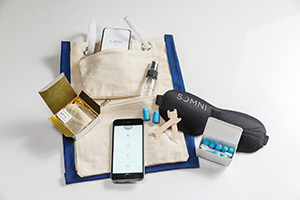 Jessica Payne
Jessica Payne
A team of Notre Dame entrepreneurs has developed a sleep-enhancing kit and app designed to boost college students’ healthy rest, memory, learning, and mental health. The approach is based on the research of Associate Professor Jessica Payne, the Nancy O’Neill Collegiate Chair in Psychology and director of the Sleep, Stress, and Memory Lab.
Matt Berg, who received his undergraduate degree in science-business in 2012 and master’s degree in the entrepreneurship master’s program (ESTEEM) in 2013, and junior Ryan Gannett work with Payne. Their company, Somni, has launched a Kickstarter campaign to raise money for kit manufacturing and app development.
Berg conceived the project after he took Payne’s The Sleeping Brain class as a senior and became aware that sleep is the foundation for learning.
“I’m very protective of my sleep now,” he said. “It’s hard to get ahold of me after 10:30, and I nap almost every day because of Jessica’s class and the benefits I’ve seen from it. If I had known all this as a freshman, how much more would I have learned and better would my college experience have been?”
 The Somni sleep-enhancing kit
The Somni sleep-enhancing kit
The product includes a kit, designed for convenience both in dorm rooms and on trips, that includes lavender spray, a silk eye mask, organic tea, ear plugs, a humidifying fan, and nasal strips. The items were chosen after exhaustive pilot studies at Notre Dame because they proved most effective in creating a sleep routine and enhancing the sleep experience.
The smartphone app includes a sleep tracking feature to help improve behavior and awareness, access to dozens of brief video clips by Payne that cover key insights about sleep, and a way to reorder supplies.
Under the guidance of Dennis Boyle, a Notre Dame alumnus and founding partner at the design firm IDEO, they have conducted more than a year of pilot studies with hundreds of students and shown that Somni users average an additional 19 minutes of sleep per night—almost a week’s worth across a year—with a 12 percent increase in feeling well rested, a 13 percent increase in alertness, and an 11 percent increase in ability to focus.
“Because the benefits of sleep compound, getting 20 extra minutes of sleep each day ultimately leads to big benefits in learning and well-being,” Payne said.
Originally published at science.nd.edu.


